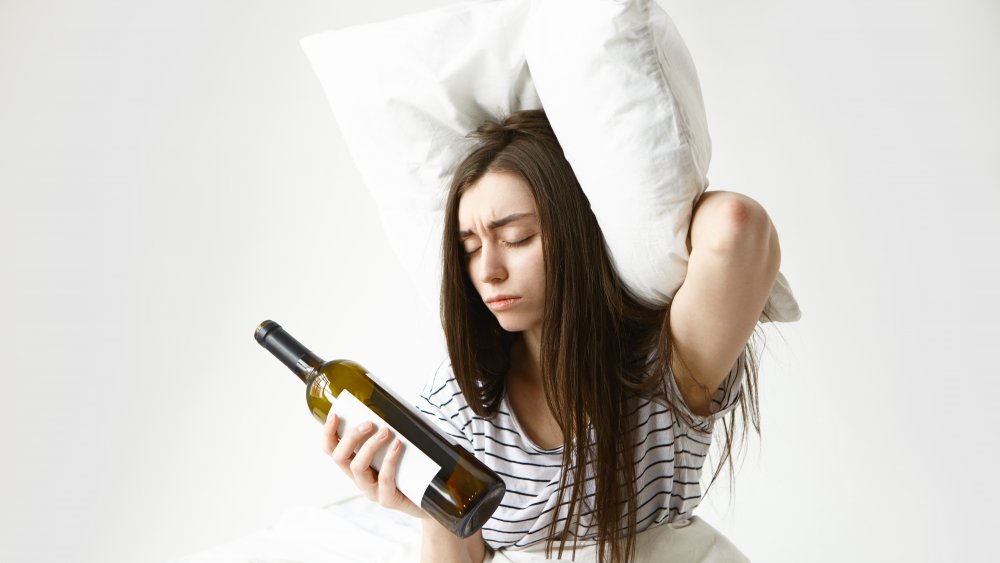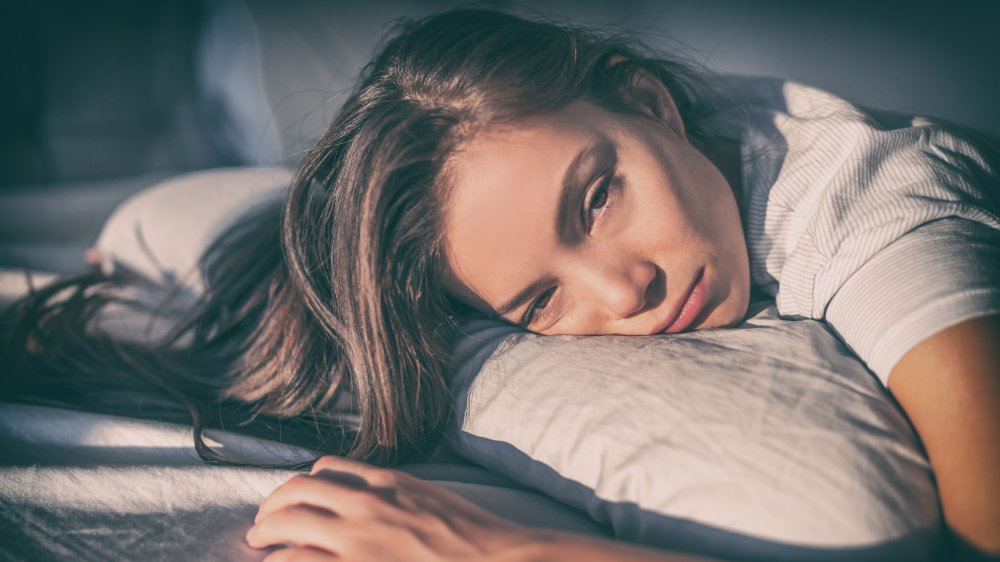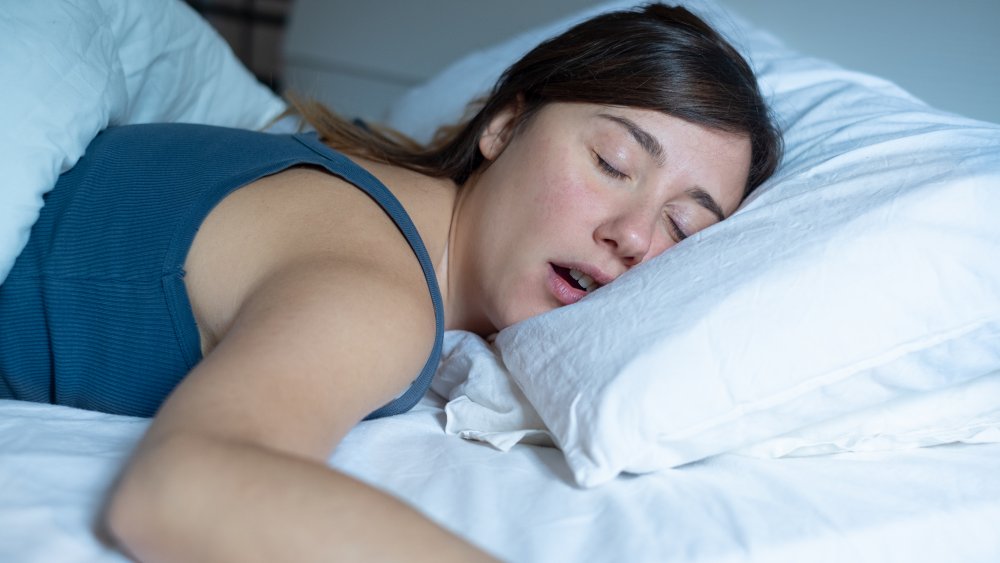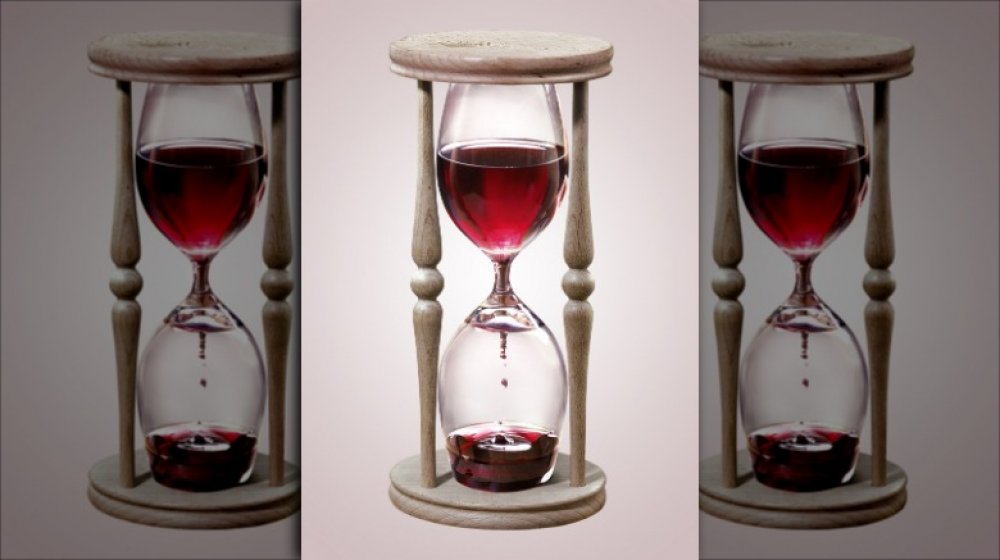You Should Never Drink Alcohol Right Before Bed. Here's Why
There are certain types of foods we consume at certain types of day — most of these for good reason. Most of us tend to drink coffee in the morning because the caffeine it contains can help to jump-start the day. At the other end of the day, many will choose to relax and unwind with an adult beverage or two. This is actually the safest and most practical choice in most cases, since drinking before (or during) work is usually not the best idea for maximizing on-the-job productivity, plus you should never, ever drink if there's a chance that you'll be needing to drive anywhere. At the end of your day, once you've settled in for the evening, at that point you are free to indulge (in moderation) should you so desire.
The trouble with nighttime drinking, though, comes when you extend the happy hour right up until bedtime. While alcohol often has the effect of making people drowsy, it's not really the best thing for ensuring a good night's sleep. In fact, the National Sleep Foundation says that alcohol can mess with your sleep patterns in a number of different ways.
You could find yourself waking during the night
The National Sleep Foundation explains that booze can cause your brain to produce a sleep-inducing chemical called adenosine, which is something people who feel they need a nightcap to see them off to slumberland may come to rely on. While you will fall asleep quickly, there's likely to be trouble ahead. Alcohol can also mess with your circadian rhythms, which means that you may find yourself waking up again in the middle of the night once that initial adenosine hit wears off. If you have another drink to put you back to sleep, this will just re-trigger the whole cycle.
Another reason you could find yourself getting up and down throughout the night after you've consumed a before-bedtime drink or two is because of the effect alcohol is known to have on the bladder. As some wise guy once said, the "wee wee hours" are the ones immediately following the "drink drink" hours.
Booze-induced sleep is low quality
Even if you do manage to stay asleep, your booze-induced coma won't be as refreshing as you might wish. Alcohol consumption tends to block REM sleep, which is the deep, refreshing, dream-bringing part of the sleep cycle, and also the time your brain learns new things. If you're not getting REM sleep, your brain — and your mood — are likely to suffer, and you may wake up feeling groggy, irritable, and generally out of sorts in a way that even immediate application of coffee can't fix.
The National Sleep Foundation also notes that alcohol tends to relax all of the muscles in your body, which may sound nice, but isn't so great once you realize this includes your throat muscles. You know, the ones that prevent you from snoring and also from suffering episodes of sleep apnea. This means that even if you go to bed with a partner, you may well wake up alone, and possibly even in respiratory distress.
How to have your drink and still get a good night's sleep
So does this mean you should stick to day drinking (and investing heavily in Uber)? No, you can still have an evening beverage, as long as you're mindful of your timing. HuffPost suggests allowing three or four hours between the time you finish that last drink and the time you turn in for the night, but that time frame may not work for those with long commutes and/or early bedtimes. Jesse Mindel, M.D., assistant clinical professor of neurology and sleep medicine at Ohio State University's Wexner Medical Center, told SELF that if you can stop consuming alcoholic beverages within at least two hours of bedtime, this shorter amount of time should still allow your body to metabolize the alcohol to the point where you can get a better night of rest than if you'd tipped one back right before you hit the hay.
Another tip for nighttime drinking is to mix your booze with some food since this should slow the absorption of the alcohol. You should also avoid bubbly beverages before bed since stomach bloating and gas aren't beneficial to good sleep (yours or your partner's). Drinking two glasses of water for every alcoholic beverage may help flush the alcohol out of your system before you sleep, though keep in mind this could possibly prompt more bathroom trips. Whatever you do, though, do not mix alcohol with any type of sleep medication, ever. The most important element of a good night's sleep is the part where you wake up again the next morning.



